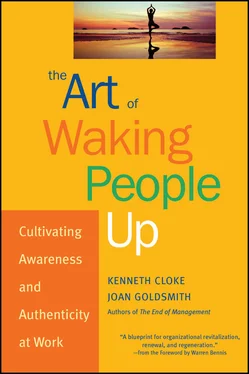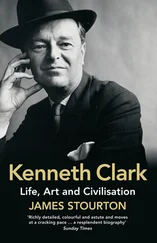We wrote this book as a companion volume to our earlier work, The End of Management and the Rise of Organizational Democracy , in which we call for organizational structures, systems, cultures, and processes that are participatory, collaborative, self-managing, and democratic. Our purpose in this book is to assist organizations, employees, teams, managers, and leaders in their efforts to break out of the trance created by working for others rather than for themselves; to develop their capacity for awareness and authenticity; and to renew their active sense of responsibility for jobs they perform but do not own.
We wrote this book to challenge everyone to become more conscious, aware, authentic, and responsible for their work environments. We wrote it to help employees design, build, reinforce, and defend the processes, techniques, cultures, structures, and systems that reward vitality, authenticity, and lifelong learning. We wrote it to advocate and promote the idea of organizational democracy as a substitute for hierarchical, bureaucratic, autocratic management-driven organizations. We wrote it to wake ourselves up, and cultivate awareness and authenticity in our own work lives.
It is difficult for anyone to clearly identify, openly discuss, or actively break the hypnotic grip of hierarchically induced apathy, passivity, cynicism, and despair once they have fallen into it. While observing the way we work is the first step in waking people up, it is also necessary to dismantle the aspects of organizations that put people to sleep, and to redesign their cultures, structures, and systems in ways that stimulate personal awareness, collaborative choice, and social responsibility.
We have all sat and watched as the truth was revealed to us—and refused to listen or understand. We have all denied what we implicitly knew was true because it was too painful or difficult to accept. We have all learned the hard way. It is therefore important to recognize at the beginning that no one can wake anyone up unless they are willing to be awakened, and that no one should be judged or censured for being unable to do so. Therefore, while we can assist people in bringing greater awareness and authenticity into their lives, it is important to do so with kindness and empathy rather than harshness and humiliation, and to act as we would like others to act toward us. Beyond this, we can concentrate on waking ourselves up and not merely speaking but being the truth. By being present and awake ourselves, we make it possible for others to do the same.
How the Book Is Structured
In the chapters that follow, we offer observations, advice, and examples to encourage you, the reader, to learn to recognize and act on what you already know to be true. We offer you assistance in giving and receiving feedback, in coaching and being coached, mentoring and being mentored, assessing performance and having your performance assessed. We offer a variety of techniques to guide you in developing the skills you need to make your work relationships more honest, open, respectful, and effective.
We also analyze the structures, systems, processes, and cultural practices that limit personal and organizational growth. We identify the behaviors that suppress awareness, creativity, and initiative and that fail to pass on the information everyone needs to develop their creativity, flexibility, leadership, and responsiveness. We recommend dozens of practical remedial activities, including strategies for encouraging the development of democratic organizations and waking even the most resistant people up.
Each section in the book stands alone and can be read in whatever order meets your needs. To aid you in your exploration, here is a brief description and outline of each section.
Context: Cultivating Awareness and Authenticity
The section considers the context in which we understand our work experiences, process our encounters, and interact with our colleagues. Our initial stimulus for personal and organizational learning is often simply a recognition that there is something we can still learn that will help us lead more satisfying work lives. Yet our desire to learn requires us to acknowledge our shortcomings and modify our attitudes and behaviors based on the feedback we receive. For this reason, the chapters in this section describe the context in which waking up at work occurs, and the difficulties encountered in shifting people’s attitudes and behaviors. We provide tools to investigate the origins of these difficulties and the dysfunctional patterns we learned in families, schools, and peer groups. We reveal methods for discovering who we really are, and expose the relationship between what appear to be personal issues and organizational design.
Processes: Championing Congruity and Commitment
This section explores ways of transforming traditional organizational processes and using them to encourage people to wake up and cultivate their awareness and authenticity. These processes allow us to bridge the gap between the intention or willingness to change and the organizational efforts needed to support people in doing so. Waking people up through turnaround feedback, coaching, mentoring, and assessment requires the use of skills not usually taught to managers plus a willingness to make waking people up a priority in the allocation of scarce organizational resources and already overcommitted work time.
The processes we recommend for supporting people in waking up include turnaround feedback, transformational coaching, strategic mentoring, and participatory assessment. We also discuss ways computer technology can be used to support these processes, including video feedback, virtual coaching, and e-mentoring.
Techniques: Encouraging Turnaround Experiences
Here, we focus on expanding and improving techniques that are commonly used to support personal change. We describe ways of adapting these methods to waking people up, encouraging them to learn from mistakes and become more responsible at work. We start with preventive measures and progress to increasingly difficult interventions as resistance to change becomes more intractable.
We focus on courageous listening, paradoxical problem solving, supportive confrontation, and risky conflict resolution. Each of these methods is redesigned and expanded to supplement turnaround feedback, transformational coaching, strategic mentoring, and participatory assessment. Each is also a useful skill in building organizational democracy.
Relationships: Sustaining Organizational Awareness and Authenticity
Finally, we consider the cultures, structures, and systems required to build and sustain organizational democracy. Hierarchical, bureaucratic, autocratic organizations put employees to sleep. To wake them up, organizations require collaborative, learning-oriented, inquiry-based cultures; synergistic, team-based structures; and integrative, value-driven systems—all of which must then be strategically integrated into a single democratic whole.
In preparing this book, our thinking has been guided by the many clients, students, and colleagues we have known as we have learned how people wake up, turn their lives around, and transform their organizations. We are grateful to each of them not only for helping us discover techniques and the reasons for embracing them, but for the courage they exhibited in being willing to change themselves and the way they work.
We would like to acknowledge all the people who, even in brief encounters, contributed in countless ways to waking us up. We want to thank those who cared enough to give us turnaround feedback, transformational coaching, strategic mentoring, and participatory assessment. Special thanks go to our mentor Warren Bennis and to Sidney Rittenberg, who helped us sharpen our ideas; to Marvin Treiger, our meditation coach; and to Monte Factor, our personal source of turnaround feedback. Our editor Susan Williams helped us conceptualize the book; our indexer Carolyn Thibault made the text more accessible; and our assistants, Solange Raro and Grace Silva, supported us throughout with loyalty and commitment. This book is dedicated to our agent Michael Cohn, who recently died, and believed in us from the beginning.
Читать дальше











